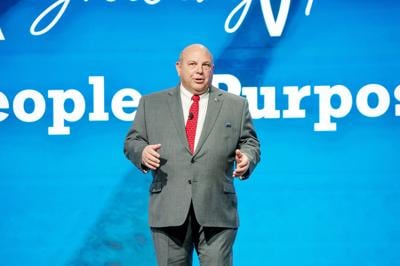
Our Klamath Basin Water Crisis
Upholding rural Americans' rights to grow food,
own property, and caretake our wildlife and natural resources.

Our Klamath Basin
Water Crisis
Upholding rural Americans' rights to grow food,
own property, and caretake our wildlife and natural resources.
https://www.capitalpress.com/nation_world/agriculture/uncertainty-over-latest-wotus-regs-may-require-supreme-court-to-sort-out-issue-farm-bureau/article_6710b052-7216-11ec-a6fb-a3da2f397ced.htmlUncertainty over latest WOTUS regs may require Supreme Court to sort out issue, Farm Bureau speakers say <
American Farm Bureau Federation President Zippy Duvall speaks
Jan. 9 during the organization’s national convention in Atlanta.
“We should not need a team of lawyers and consultants just to be
able to farm our land,”
he said of the Waters of the U.S. regulations. <
American Farm Bureau Federation President Zippy Duvall speaks
Jan. 9 during the organization’s national convention in Atlanta.
“We should not need a team of lawyers and consultants just to be
able to farm our land,”
he said of the Waters of the U.S. regulations.ATLANTA — As farmers contend with the latest change in federal Clean Water Act authority, their best hope for clarity may lie with the U.S. Supreme Court. Growers should speak out against the Biden administration’s proposed expansion of federal “waters of the U.S.” jurisdiction, or WOTUS, according to speakers at the American Farm Bureau Federation’s annual convention in Atlanta, Ga. “We should not need a team of lawyers and consultants just to be able to farm our land,” said Zippy Duvall, AFBF’s president, on Jan. 9. The extent of the federal government’s ability to regulate farmland under the Clean Water Act has a long and contentious history. Fifteen years ago, the U.S. Supreme Court ruled that wetlands with a “significant nexus” to a navigable waterway come under the government’s authority, but that didn’t resolve the controversy. Several presidential administrations have interpreted the ruling differently in their regulations. Most recently, the Biden administration proposed a change to the Trump administration’s rules, which had limited federal jurisdiction over wetlands. Congress could amend the Clean Water Act to clarify the law’s intentions, but that’s not likely to happen, said Courtney Briggs, AFBF’s senior director of congressional relations. “The votes aren’t there,” she said. However, with the U.S. Supreme Court skewing more conservative after the confirmation of two justices nominated during the Trump administration, new case law on WOTUS is possible. “That would be our best bet right now,” Briggs said. Regulations under the Clean Water Act are complicated and nuanced, but Briggs explained that the Biden administration made a distinct change to the rules. Under the Trump administration’s interpretation, “ephemeral,” or temporary, waters did not come under federal authority, while the Biden administration’s interpretation would expand the government’s reach, she said. “They use incredibly vague terms,” Briggs said. Potentially, the regulation of ephemeral waters would apply to ditches and other drainage areas, as well as low spots that collect water on fields, she said. “That’s what we’re really fighting over,” she said. “We’re fighting over the ephemerals.” It’s possible that the Supreme Court could review a lawsuit that brings more certainty to WOTUS authority, Briggs said. One candidate is a longstanding legal dispute between the federal government and landowners near a lake in Idaho, she said. “That could really provide some clarity.” The Biden administration has underestimated the regulatory change’s effect on agriculture, claiming that it won’t negatively affect businesses, Briggs said. “I just about fell out of my chair when I read that,” she said. Part of the battle over WOTUS will be convincing lawmakers and others that farmers already go to great lengths to preserve water quality, she said. Farmers care about the water used by their families and communities, contrary to the stigma created by critics that the agriculture industry wants to weaken water protections, Briggs said. “There’s a reputation that farmers don’t care about preserving the environment,” which also needs to change, she said.
==================================================== In accordance with Title 17 U.S.C. section 107, any copyrighted material herein is distributed without profit or payment to those who have expressed a prior interest in receiving this information for non-profit research and educational purposes only. For more information go to: http://www.law.cornell.edu/uscode/17/107.shtml |
Page Updated: Tuesday January 18, 2022 03:27 PM Pacific
Copyright © klamathbasincrisis.org, 2001 - 2021, All Rights Reserved